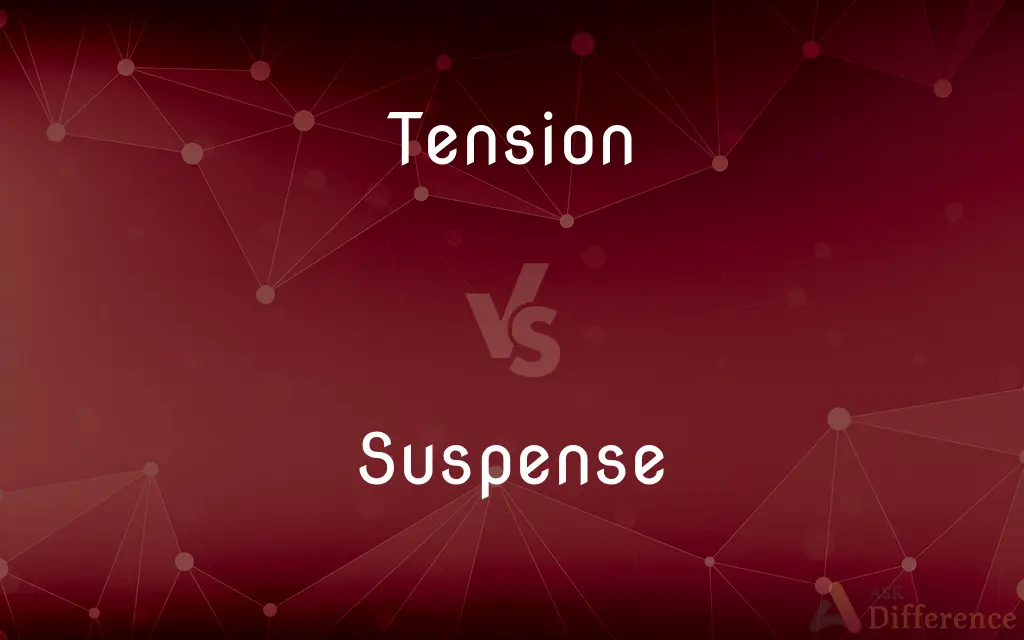Tension vs. Suspense — What's the Difference?
By Maham Liaqat & Fiza Rafique — Updated on March 19, 2024
Tension is the immediate unease or stress in a situation, focusing on the present moment, while suspense builds anticipation for future events.

Difference Between Tension and Suspense
Table of Contents
ADVERTISEMENT
Key Differences
Tension arises from the immediate conflict or stress within a scene, capturing the audience's attention through the characters' current challenges. It often involves a direct, palpable sense of unease that grips the viewer or reader, emphasizing the here and now. Whereas, suspense is crafted through the anticipation of what might happen next, extending beyond the present moment to keep the audience engaged with the storyline's potential developments.
While tension thrives on the present moment's emotional and psychological stress, suspense relies on the uncertainty of future outcomes. Suspense involves the strategic withholding of information, creating a longing in the audience to discover what lies ahead. On the other hand, tension often does not need such withholding; it's felt in the immediate confrontation or dilemma faced by the characters.
Tension can exist in any genre, using conflicts and obstacles to elicit a visceral reaction from the audience. It is not necessarily dependent on the narrative's larger plot but can arise from smaller, moment-to-moment interactions and conflicts. Suspense, however, often requires a more significant narrative structure, building over time and often across larger segments of the story, to effectively keep the audience guessing about future developments.
Suspense and tension, while distinct, often work together to enhance a story's emotional impact. A suspenseful plot can heighten the tension by increasing the stakes of immediate conflicts, whereas tension can make the anticipation of suspenseful outcomes even more compelling.
In stories, tension might resolve quickly or fluctuate frequently, reflecting the dynamic nature of immediate conflicts and emotional states. Suspense, however, tends to build more gradually and resolve less frequently, culminating in key moments that significantly advance the plot or reveal important information.
ADVERTISEMENT
Comparison Chart
Focus
Immediate conflict or stress
Anticipation of future events
Information
Often transparent; based on current situation
Withheld to build anticipation
Genre
Any, not dependent on plot
Often requires a narrative structure
Emotional Response
Immediate and visceral
Longing and anticipation
Resolution
Can be frequent and fluctuates
Builds gradually, resolves in key moments
Compare with Definitions
Tension
The emotional strain or pressure in a specific moment.
The tension in the room spiked as the two rivals faced off.
Suspense
The delay of the outcome to heighten anticipation.
The play’s suspense was built up through a series of misleading clues.
Tension
A feeling of nervousness before a significant event.
You could cut the tension with a knife before the final announcement.
Suspense
An anxious anticipation.
There was a palpable suspense in the air as the detective prepared to reveal the culprit.
Tension
The stress or unease due to conflicting interests or needs.
Tension arose between the teammates over the best strategy.
Suspense
A literary technique used to create emotional tension.
The film used suspense to keep the audience guessing until the very end.
Tension
A literary device to create emotional discomfort.
The author expertly crafted tension in the narrative through misunderstandings.
Suspense
The feeling when one is eager to know or see something.
The children waited in suspense for the magician to perform his next trick.
Tension
The physical strain on materials.
The tension on the rope increased as the weight did.
Suspense
A state of mental uncertainty or excitement about future events.
The suspense of the mystery novel kept readers on the edge of their seats.
Tension
The act or process of stretching something tight.
Suspense
Suspense is a state of mental uncertainty, anxiety, being undecided, or being doubtful. In a dramatic work, suspense is the anticipation of the outcome of a plot or of the solution to an uncertainty, puzzle, or mystery, particularly as it affects a character for whom one has sympathy.
Tension
The condition of so being stretched; tautness.
Suspense
Anxiety or apprehension resulting from an uncertain, undecided, or mysterious situation
The suspense as they were announcing the winners was unbearable.
Tension
A force tending to stretch or elongate something.
Suspense
The quality in a work of narrative art, such as a novel or film, that causes the audience to experience pleasurable excitement and anticipation regarding an outcome.
Tension
A measure of such a force
A tension on the cable of 50 pounds.
Suspense
(Archaic) The state or quality of being undecided, uncertain, or indecisive
The suspense of judgment.
Tension
Mental, emotional, or nervous strain
Working under great tension to make a deadline.
Suspense
The condition of being suspended; cessation for a time.
Tension
Barely controlled hostility or a strained relationship between people or groups
The dangerous tension between opposing military powers.
Suspense
The pleasurable emotion of anticipation and excitement regarding the outcome or climax of a book, film etc.
Tension
A balanced relation between strongly opposing elements
"the continuing, and essential, tension between two of the three branches of government, judicial and legislative" (Haynes Johnson).
Suspense
The unpleasant emotion of anxiety or apprehension in an uncertain situation.
Tension
The interplay of conflicting elements in a piece of literature, especially a poem.
Suspense
(legal) A temporary cessation of one's right; suspension, as when the rent or other profits of land cease by unity of possession of land and rent.
Tension
A device for regulating tautness, especially a device that controls the tautness of thread on a sewing machine or loom.
Suspense
A deadline.
Tension
(Electricity) Voltage or potential; electromotive force.
Suspense
(obsolete) Held or lifted up; held or prevented from proceeding.
Tension
To subject to tension; tighten.
Suspense
(obsolete) Expressing, or proceeding from, suspense or doubt.
Tension
The condition of being held in a state between two or more forces, which are acting in opposition to each other.
Suspense
Held or lifted up; held or prevented from proceeding.
[The great light of day] suspense in heaven.
Tension
Psychological state of being tense.
Suspense
Expressing, or proceeding from, suspense or doubt.
Tension
A feeling of nervousness, excitement, or fear that is created in a movie, book, etc.; suspense.
Suspense
The state of being suspended; specifically, a state of uncertainty and expectation, with anxiety or apprehension; indetermination; indecision; as, the suspense of a person waiting for the verdict of a jury.
Ten days the prophet in suspense remained.
Upon the ticklish balance of suspense.
Tension
State of an elastic object which is stretched in a way which increases its length.
Suspense
Cessation for a time; stop; pause.
A cool suspense from pleasure and from pain.
Tension
Force transmitted through a rope, string, cable, or similar object (used with prepositions on, in, or of, e.g., "The tension in the cable is 1000 N", to convey that the same magnitude of force applies to objects attached to both ends).
Suspense
A temporary cessation of one's right; suspension, as when the rent or other profits of land cease by unity of possession of land and rent.
Tension
Voltage. Usually only the terms low tension, high tension, and extra-high tension, and the abbreviations LT, HT, and EHT are used. They are not precisely defined; LT is normally a few volts, HT a few hundreds of volts, and EHT thousands of volts.
Suspense
Apprehension about what is going to happen
Tension
To place an object in tension, to pull or place strain on.
We tensioned the cable until it snapped.
Suspense
An uncertain cognitive state;
The matter remained in suspense for several years
Tension
The act of stretching or straining; the state of being stretched or strained to stiffness; the state of being bent strained; as, the tension of the muscles, tension of the larynx.
Suspense
Excited anticipation of an approaching climax;
The play kept the audience in suspense
Tension
Fig.: Extreme strain of mind or excitement of feeling; intense effort.
Tension
The degree of stretching to which a wire, cord, piece of timber, or the like, is strained by drawing it in the direction of its length; strain.
Tension
The force by which a part is pulled when forming part of any system in equilibrium or in motion; as, the tension of a srting supporting a weight equals that weight.
Tension
A device for checking the delivery of the thread in a sewing machine, so as to give the stitch the required degree of tightness.
Tension
Expansive force; the force with which the particles of a body, as a gas, tend to recede from each other and occupy a larger space; elastic force; elasticity; as, the tension of vapor; the tension of air.
Tension
The quality in consequence of which an electric charge tends to discharge itself, as into the air by a spark, or to pass from a body of greater to one of less electrical potential. It varies as the quantity of electricity upon a given area.
Tension
Feelings of hostility that are not manifest;
He could sense her latent hostility to him
The diplomats' first concern was to reduce international tensions
Tension
(psychology) a state of mental or emotional strain or suspense;
He suffered from fatigue and emotional tension
Stress is a vasoconstrictor
Tension
The physical condition of being stretched or strained;
It places great tension on the leg muscles
He could feel the tenseness of her body
Tension
A balance between and interplay of opposing elements or tendencies (especially in art or literature);
There is a tension created between narrative time and movie time
There is a tension between these approaches to understanding history
Tension
(physics) a stress that produces an elongation of an elastic physical body;
The direction of maximum tension moves asymptotically toward the direction of the shear
Tension
The action of stretching something tight;
Tension holds the belt in the pulleys
Common Curiosities
What is tension?
Tension refers to the immediate feeling of stress or strain within a situation, often marked by emotional or physical discomfort.
What is suspense?
Suspense is the feeling of excited or anxious uncertainty about what may happen, often involving the anticipation of future events or outcomes.
Do tension and suspense always work together?
While they often complement each other, tension and suspense can function independently to serve different narrative purposes.
Is tension more physical or psychological?
Tension can be both physical and psychological, depending on the context and nature of the conflict or stress.
How do authors create suspense?
Authors create suspense by withholding information, setting up intriguing questions, and strategically delaying resolutions to keep readers engaged.
What role does the audience's expectation play in suspense?
The audience's expectations are crucial in suspense, as it relies on their engagement and anticipation of future developments or twists.
How do tension and suspense differ in storytelling?
Tension focuses on immediate conflicts and emotional states, while suspense builds anticipation for future plot developments.
Can a story have tension without suspense?
Yes, a story can have moments of tension without relying on suspense, focusing on the present conflicts without significant anticipation for future events.
How does suspense enhance a narrative?
Suspense enhances a narrative by keeping the audience engaged and eager to discover future events or outcomes, adding depth to the story's emotional impact.
Is suspense necessary in all genres?
While not necessary in all genres, suspense can enhance many types of stories by adding depth and emotional engagement.
Can suspense exist without tension?
Suspense can exist without immediate tension but often uses underlying tension to build anticipation more effectively.
How is tension used in non-fiction?
In non-fiction, tension can arise from real-life conflicts, challenges, or dilemmas, engaging readers with the stakes and emotions involved.
What makes a suspenseful story successful?
A suspenseful story successfully maintains a delicate balance between revealing and withholding information, keeping the audience intrigued without frustrating them.
Can tension be resolved quickly in a story?
Yes, tension can be resolved quickly, reflecting the fluctuating nature of conflicts and emotional states in a narrative.
How do filmmakers use suspense?
Filmmakers use suspense through visual cues, pacing, and narrative structure to build anticipation and engage the audience visually and emotionally.
Share Your Discovery

Previous Comparison
Anybody vs. Anyone
Next Comparison
Soprano vs. TenorAuthor Spotlight
Written by
Maham LiaqatCo-written by
Fiza RafiqueFiza Rafique is a skilled content writer at AskDifference.com, where she meticulously refines and enhances written pieces. Drawing from her vast editorial expertise, Fiza ensures clarity, accuracy, and precision in every article. Passionate about language, she continually seeks to elevate the quality of content for readers worldwide.
















































